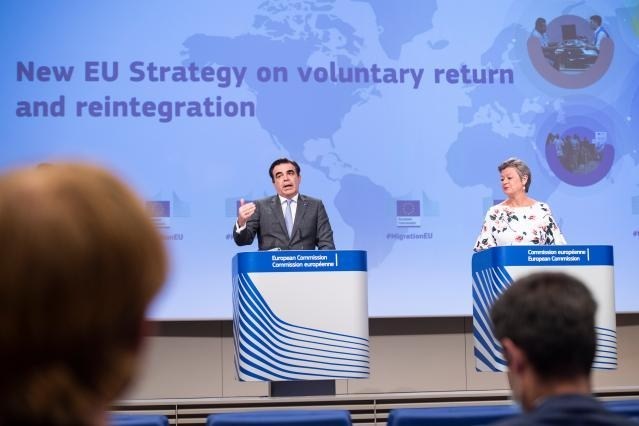The European Commission has adopted a new strategy on voluntary return and reintegration of migrants and asylum seekers with no right to stay in the EU as a part of a common EU system.
The new strategy is described as a key objective under the so-called pact on migration and asylum which was presented by the Commission in September last year. Currently, only about a third of people with no right to stay in the EU return to their country of origin and of those who do, fewer than 30% do so voluntarily.
Voluntary return is the assisted or independent return of a person who does not have the right to stay in the EU to their country of origin or transit, based on their own free will. To encourage and facilitate voluntary returns, member states may offer to assist the returnee, for example by covering the travel expenses and providing help, in cash or in-kind, for a short period upon arrival.
People with no right to stay are generally given a period for voluntary departure during which they should return voluntarily in compliance with a return decision. This period normally varies between 7 and 30 days. During this period, the authorities may not enforce the decision unless they identify a risk of absconding or security risks.
“Voluntary returns are always the better option: they put the individual at the core, they are more effective and less costly,” said Ylva Johansson, Commissioner for Home Affairs, at a press briefing last week (27 April).
Margaritis Schinas Vice-President for Promoting our European Way of Life, was frank at the briefing and admitted that the return policy until now has been a failure. The low return rate from the EU is a result of several factors including fragmented and inefficient procedures within the EU as well as low levels of cooperation of countries outside the EU on identification and readmission of returnees.
The system needs to be fixed and the new strategy for voluntary returns and reintegration sets out measures to strengthen the legal and operational framework and improve the quality of return and reintegration programs.
Enhanced role for Frontex in returns
Among others Frontex, the European Border and Coast Guard Agency will get an enhanced mandate to increase its capacity to support member states in all stages of the voluntary return and reintegration process. Frontex has been accused of illegal pushbacks of migrants but Johansson expressed her full trust in the agency after it has been cleared in an internal investigation.
“We don’t accept any cheap bashing of Frontex,” she said and assured that the agency will have the resources to carry out its tasks, including returns. The agency started supporting member states in the area of voluntary returns in 2020. Around 18% of its return operations organised were voluntary returns, and this share is increasing.
“We need to do everything to save lives,” she underlined and referred to the tragedies in the Mediterranean Sea when illegal migrants have drowned trying to reach EU shores in overcrowded unworthy vessels lured by traffickers.
A return Coordinator and High-Level Network for Return, comprising representatives from member states, will be established to provide further technical support to the Member States to bring more coherence between different policies that affect the effectiveness of return policies,
Asked about the recent Danish decision to revoke residency permits for Syrian refugees, she replied that it concerns her. “Nobody can be forced to return to Syria,” she said. She had talked to the Danish authorities which assured her that they will respect the principle of non-refoulment. However, she added that Denmark has opted out of the EU acquis on migration.
No agreement on EU list of safe countries
The non-refoulment principle guarantees that no one should be returned to a country where they would face torture, cruel, inhuman or degrading treatment or punishment, and other irreparable harm. Even if that would not be the case in Syria today, refugees that left the country are seen as enemies by the regime and are likely to be denied access to their former homes and any government assistance.
The Commission considers that if someone’s asylum claim is rejected today, it is because that the applicant can safely return to his/her country, based on an individual assessment. Currently, there is no common EU list of safe third countries and countries of origin and the new pact called for a higher degree of harmonisation through EU lists.
Commissioner Johansson did not address the issue of a common EU list and stressed that every member state must make an individual assessment in each return case, where the personal situation is examined and the principle of non-refoulment is upheld.
The European Asylum Support Office publishes guidance on countries of origin. Member state authorities are responsible for making the return decisions which until now has resulted in a non-uniform application of the return policy. Under the Return Directive, the decisions are subject to a remedy before a court.
In 2016, the Commission proposed a safe country list in the Asylum Procedure Regulation. Under the proposal, all asylum applications from nationals of a country on the safe country list would still continue to be assessed on an individual, case-by-case basis.
Strong safeguards, including the right to appeal, would remain in place. A European list would however allow for swifter processing of individual asylum applications from candidates originating from countries considered to be safe, and for faster returns if, following an individual assessment of the application, the claim for asylum is rejected.
However, during the last round of negotiations, the Council did not agree on a position on a common European list of safe countries of origin as proposed by the Commission.
M. Apelblat
The Brussels Times

